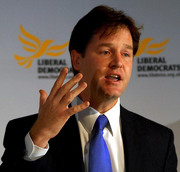 Nick Clegg joins the ‘progressive’ debate with a double of salvo in The Times and in a pamphlet, titled ‘The liberal moment’, published by Demos. The philosophically anachronistic Labour party is his target. He writes:
Nick Clegg joins the ‘progressive’ debate with a double of salvo in The Times and in a pamphlet, titled ‘The liberal moment’, published by Demos. The philosophically anachronistic Labour party is his target. He writes:
‘The contrast between Labour and liberals is starkest in their different approaches to power. While Labour hoards at the centre, liberals believe that power must be dispersed away from government – downwards to individuals and communities, and upwards to the international institutions needed to tackle our collective problems.
State-centered, top-down solutions are wholly out of step with the demands of our age. Devising a fairer tax system, protecting civil liberties, reforming our clapped-out politics, breaking up monopolistic banks, devolving public services and developing a new concept of green citizenship and internationalism – all require the radical dispersal of power that liberals champion.’
Besides the characterisation of ‘monopolistic banks’ and reservations about quite how uncomfortable being a ‘green citizen’ might be, it’s an attractive analysis; and, on the face of it, like Vince Cable’s planned cuts, the Tories and the Liberal Democrats share common ground. Clegg acknowledges this, arguing that the real choice at the next election is a ‘yellow and blue’ face-off, and that the Conservatives merely ‘spout the language of change to maintain the status quo’.
Clegg undoes himself here. Tory policy is undeveloped, but the premises are unanswerable. Proposed Conservative reforms on cuts, education, public services, Westminster and the demolition of the bureaucratic state is a reform agenda that is driving ‘progressive politics’, hence the many similarities between Tory and Lib Dem policy. There are also radical reforms, such as IDS’ welfare reforms, which are yet to be adopted as party policy. Under Clegg’s criteria, if Labour represented change in 1997, paradoxically, Conservatism does so now. The Tory leadership must develop policy and take advantage of this opportunity.
UPDATE: Many Coffee Housers have raised the Liberal Democrat position on Europe. Certainly their support for the Lisbon treaty doesn’t chime well with public opinion, but are they altering their overall stance? Clegg writes in the Times that he seeks ‘a more effective and accountable European Union. Dispersing power more fairly and holding the powerful to account runs as a thread through all my liberal beliefs.’ It’s a start.






Comments